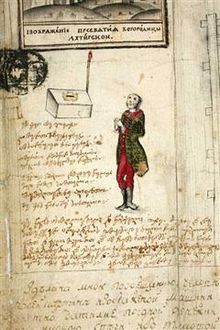- Davit Guramishvili
-
 The Ukrainian hryvnia coin commemorating Davit Guramishvili. 2005
The Ukrainian hryvnia coin commemorating Davit Guramishvili. 2005
Prince Davit Guramishvili (Georgian: დავით გურამიშვილი) (1705 – July 21, 1792) was a Georgian poet who authored the finest pieces of pre-Romantic Georgian literature. His poetic talents thrived far from his motherland, being forced by personal misfortunes and turmoil in Georgia to spend several years in the Russian military service until his retirement to his small Ukrainian estate at Myrhorod where he made eighty-seven years of his tragic and turbulent life into one cycle of autobiographical poetry, the Davitiani, which he sent to Georgia through a Georgian embassy returning from the Russian empire in 1787.
Contents
Biography
Born in the village of Gorisubani into the Georgian princely family of Guramishvili (a branch of the greater Amilakhvari house), Davit Guramishvili spent his early years in his patrimonial estate near Saguramo. As an eighteen-year-old he took part in the battle of Zedavela, which resulted in the defeat of King Vakhtang VI of Kartli at the hands of Ottoman army, Dagestani clansmen and renegade Georgians that plunged Georgia into complete anarchy. This period is chronicled in several sections of Guramishvili’s Davitiani (დავითიანი) conventionally called Georgia’s Afflictions (ქართლის ჭირი).
In 1727/8 Guramishvili was snatched from his bride by the marauding tribesmen from Dagestan and spent several months in captivity before he managed to escape and make his way on foot to the north. Through the pathless mountains, he continued his way into the Terek Valley where he encountered a Cossack station. From there, headed for Moscow and joined King Vakhtang VI’s entourage in their Russian exile. The sincere and vivid account of his imprisonment, his despair and attempts to escape, and his religious solace form the next twenty-five poems of his collection.
In Moscow, he engaged in Vakhtang’s cultural and educational enterprises. Following the king’s death in 1737, his nobles, including Guramishvili, pledged their loyalty to the Russian crown and joined the Imperial army, forming a Georgian Hussar Regiment. On this occasion, Guramishvili was bestowed with estates at Myrhorod and Zubovka in Ukraine. As a Russian Hussar officer, he fought in the wars against Ottoman Empire (1735-1739), Sweden (1741-1743) and in the Seven Years' War (1756–1763) during which he was wounded and captured by the Prussian army. It was not until December 1759 that he was released from the Magdeburg prison and allowed to return to Russia. Invalidated, Guramishvili retired from the military service and withdrew into his estate where he lived together with his young wife Princess Tatiana Avalishvili.
Here he introduced Georgian water-mills to the Ukrainian peasantry and wrote poetry of lament, repent, and console for the misfortunes of Georgia and his own life. Apart from the Georgian folk sub-text, he also exploited Russian, Ukrainian and Polish motifs and combined, in the words of Professor Doland Rayfield, "two apparently incompatible elements, the Georgian psalmist’s spiritual asceticism and the Russian peasant’s carnal hedonism."[1]
A surprising shift from religious fervor to playful eroticism follows in Zubovka (ზუბოვკა), a song of dalliance with a peasant girl. The most vernal and pastoral of his poems, Katsvia the Shepherd (ქაცვია მწყემსი) is a surreal idyll in which the poet narrates family life of the Georgian mountains and imagines the Eden Georgia without war, corruption, and natural calamity. The whole compilation concludes with a revert to religious contemplation, with the poet’s testament and epitaph.
In 1787, at the age of 82, Guramishvili accidentally met the Georgian prince Mirian, send by his father King Heraclius II of Georgia on a diplomatic mission to Russia. Mirian brought Guramishvili’s manuscript to Georgia where it was published in 1870. In 1792, the poet died and was buried at the Assumption Church in Myrhorod.
Notes
- ^ Rayfield (2000), p. 117.
See also
References
- Rayfield, Donald (2000), The Literature of Georgia: A History: 1st edition, pp. 116–120. Routledge, ISBN 0-7007-1163-5.
- Mikaberidze, Alexander (2007), Guramishvili, David. Dictionary of Georgian National Biography.
External links
- (Georgian) Website dedicated to David Guramishvili
- (Ukrainian) Vira Kulova (2003), Грузинський князь (Georgian Prince). Khreschatik №156 (2363).
Categories:- 1705 births
- 1792 deaths
- Poets from Georgia (country)
- Nobility of Georgia (country)
- Imperial Russian military personnel
- Russian military personnel of the Seven Years' War
Wikimedia Foundation. 2010.

